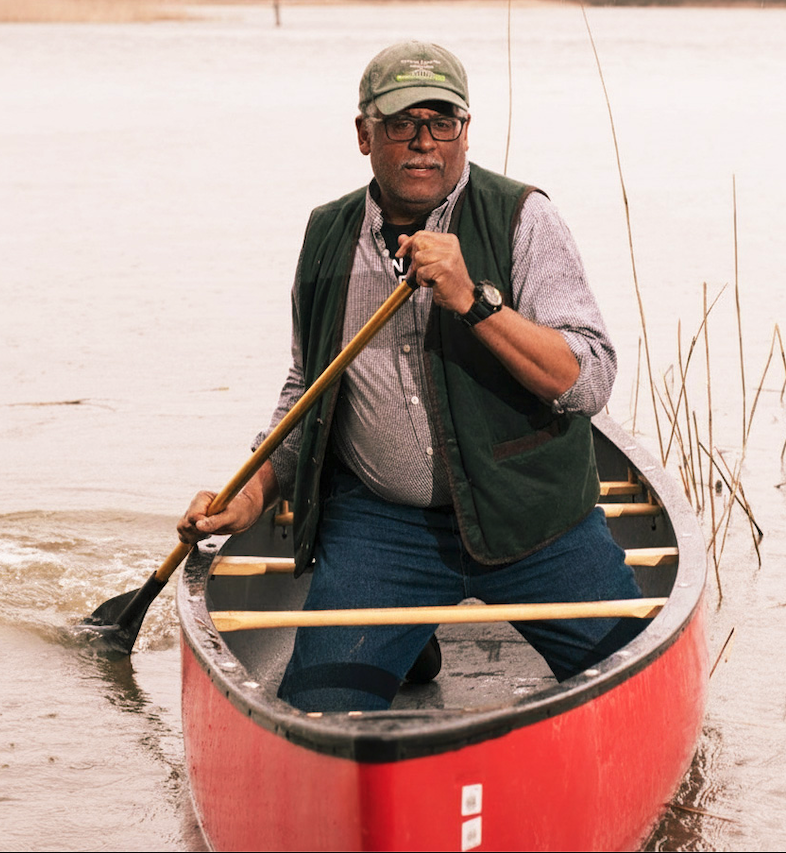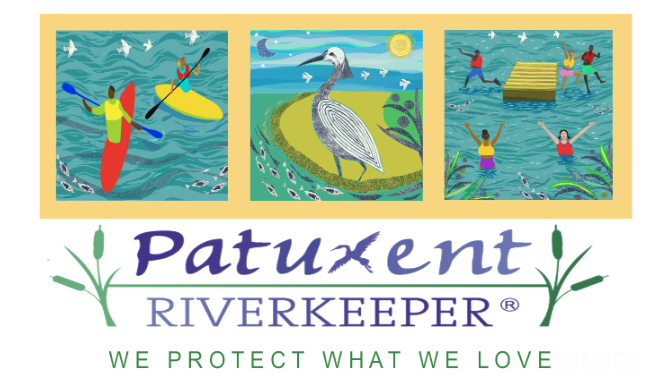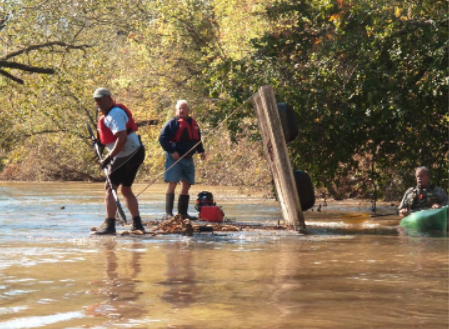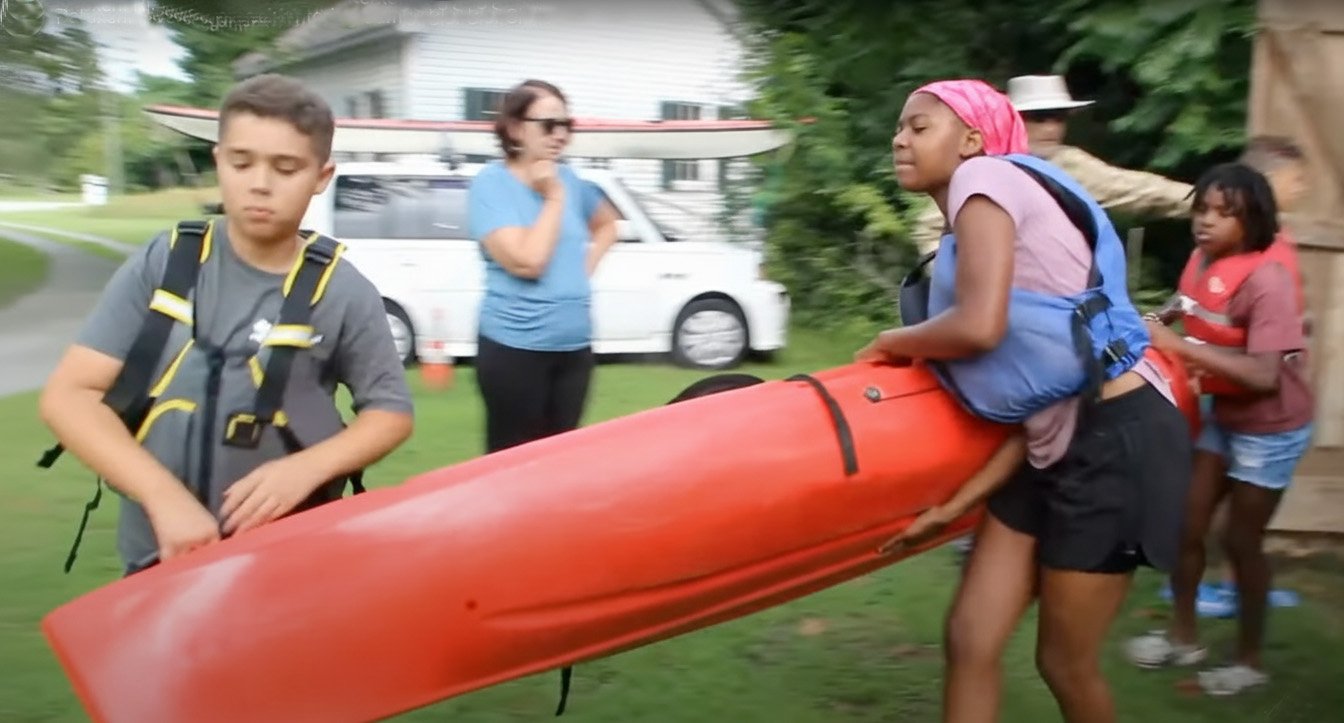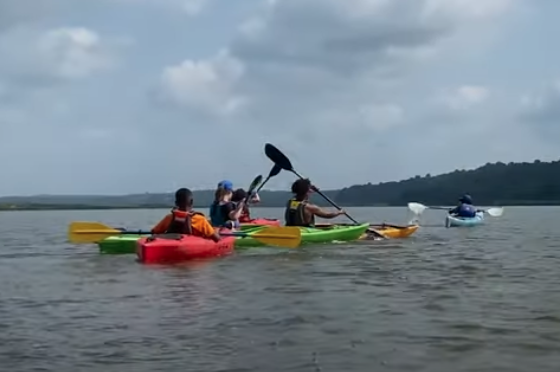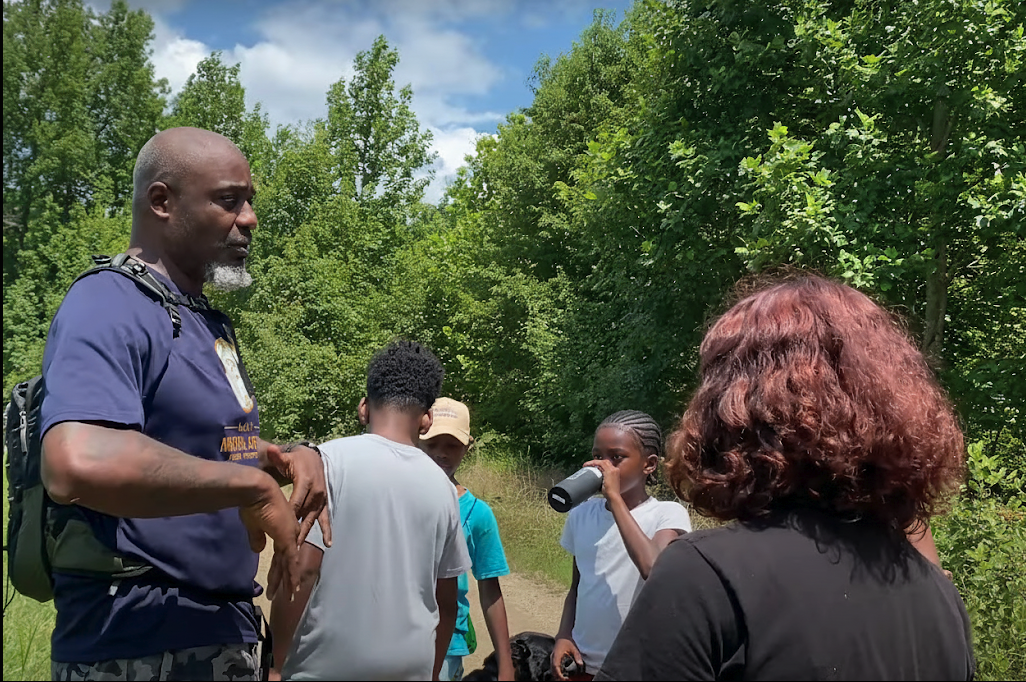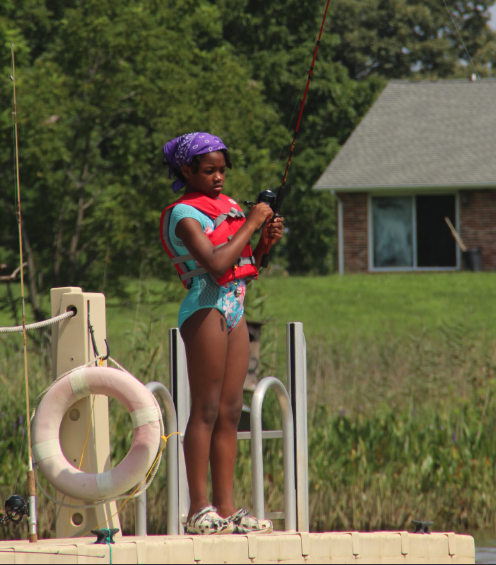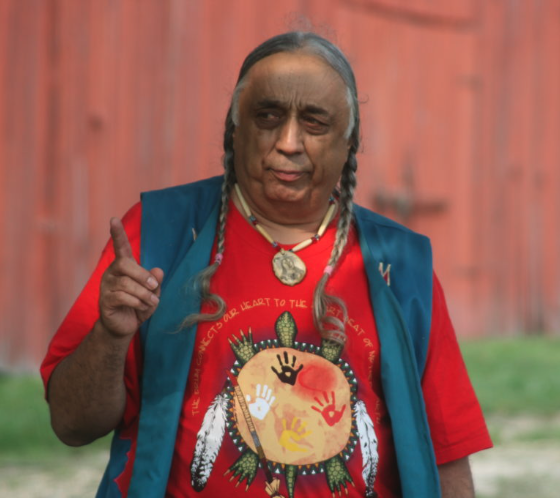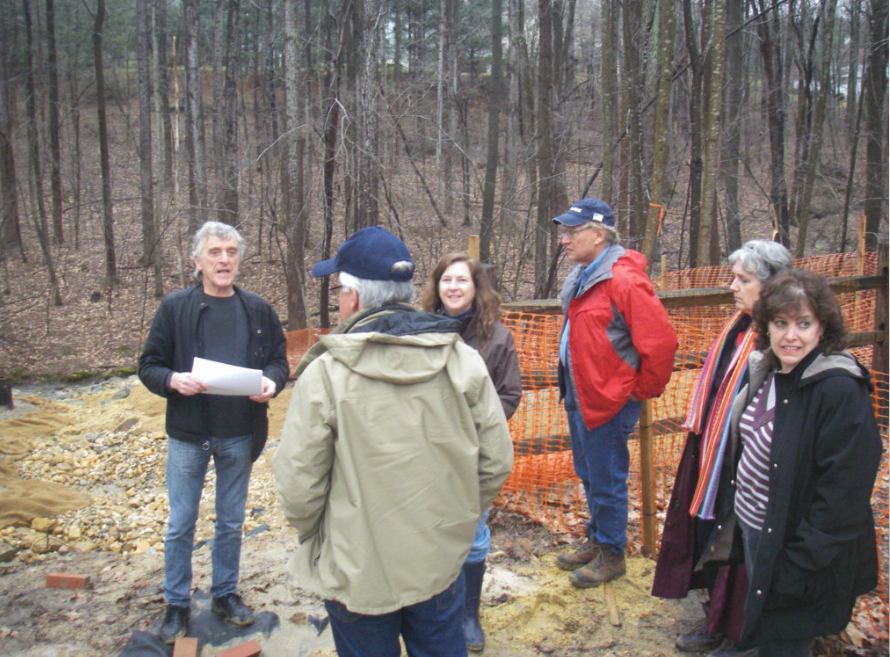Patuxent River flowing over a low fall.
In the Algonquin language “Patuxent” means water running over smooth pebbles. It calls Fred Tutman back.
Photo: Southern Maryland National Heritage Area
I never imagined I would end up as a “river keeper” … but I inevitably was drawn back to watch over my home river
Fred Tutman
The Patuxent River, Maryland’s deepest and longest river, runs 115 miles from the Maryland piedmont down to Prince George’s County near Washington, DC. And extending from antiquity, its human life evolved as Algonquin-speaking peoples and its American life encompasses the development of the mid-Atlantic region from the colonial period onward
I am a Patuxent River native son. I grew up near its banks on our family farm in Queen Anne, Maryland. I am also the rare black American riverkeeper, working to protect the Patuxent River and its community of people through a group I founded, Patuxent Riverkeeper.
I hadn’t imagined I would end up as its “riverkeeper” and protector or establish the organization Patuxent Riverkeeper. Actually, I had never heard the term when I first encountered it on a fateful day back in 2003 while attending a meeting of environmentalists. At the time, I should have been in a law school class but I was determined to somehow connect my law school studies back to the environment.
Protecting the environment, being outdoors and helping people interested me quite a lot. Maybe law plus the environment was a realm where I could do work that mattered and where I could work on things I deeply cared about?
So, there I was in Annapolis, February 1, 2003, the same day Space Shuttle Columbia burned up in the atmosphere. During the meeting, a guy walked into the room and you could feel his charisma and authority from across the room. I heard somebody say, “that’s the riverkeeper” for the Severn River.
“What is a riverkeeper,” I wondered?
Since my teens, my family had been local activists, making “good trouble” to preserve our community sense of place and our family farm in a rural neighborhood in Maryland called Queen Anne.
Queen Anne’s Town, a river port, was named by an Act of British Parliament in the late 1700s when tobacco was king and America, a British colony shipping goods to the Sovereign. But long before the British and their descendants settled here, Algonquin-speaking people thrived on the Patuxent’s shores and feasted on its fish. This river was once host to nearly 100 species of fish in its northern freshwater reaches, blue crabs in the brackish depths of its mid-section, and oysters in its saltier southern zones.
It is said that the word “Patuxent” means water running over smooth pebbles but it is also said that this metaphor could just as easily be applied to a beautiful woman: metaphorically speaking, the Patuxent River is both.
To me, a river rat from an early age, the Patuxent was an endless source of wonder and exploration. I saw its many moods ranging from bucolic and placid to when it churned at flood stage and submerged local bridges and roads.
The river was a constant in my early years. Fish fries featuring a Patuxent catch were sponsored by the venerable old Mt. Nebo African Methodist Episcopal Church. My Dad and I would fashion fish baskets from chicken wire, tie them to a log in the river and overnight those baskets would fill with yellow perch for our table, which could be dredged in flour, sprinkled with salt and pepper, sometimes fried in on a camp fire next to the river.
On summer days during tobacco harvest season, I would ride on large farm carts laden with fresh cut green tobacco down country lanes where we would stop, sit in the shade and slake our thirst with pure spring water from natural seeps that drained to the river.
Back then, I knew very little about where the Patuxent started or where it ended. I knew only that it passed through my neighborhood and brought all sorts of detritus like lost boats, deck chairs and other treasures from unknown parts upstream.
After my initial riverkeeper encounter in 2003, I read the bestselling book, The Riverkeepers: Two Activists Fight to Reclaim Our Environment as a Basic Human Right by John Cronin and Robert Kennedy, Jr., that described how the movement started as a grassroots movement on the Hudson River in New York when commercial fisherman fought to enforce anti-pollution laws against violators who were making it hard for them to earn a living. From this impetus, a water protection movement was born.
In an paradoxical twist of fate, Robert Kennedy, Jr. is now working for an administration that, in gutting the EPA and enacting other environmentally hostile measures, blatantly spurns what Kennedy claimed in his book as being a basic “human right.”
In 2004, I threw myself into the work of working, strategizing, struggling and advocating to protect the waters of the Patuxent River. But the part that I found most rewarding of all, was the relationship with people and communities.
As a river advocate, I could invest the human capital needed to protect a mighty river. It was a journey of self-discovery, and a quest to be my own man, all while making a stand for something I truly believed in!
In the 1970s the Patuxent became the epicenter of a mighty battle as clean water advocates sued and fought with the State of Maryland over the future of this river. These battles eventually morphed into a much larger movement to save not only the Patuxent but also to conserve the thousands of tributaries that shared a common drainage to the nation’s largest estuary, the Chesapeake Bay.
It so happens that very little that is good in my life has come about without some struggle attached to it. I had struggled to make a name for myself as a media professional, to build a house, to get a Masters’s degree, to start a business, to get into law school, and I had stood shoulder to shoulder with my neighbors to protect the rural, undeveloped atmosphere in my tiny home community.
The first time I found myself behind the controls of a motor boat patrolling the river that I grew up next to, a whole new world opened up for me. With my hand on the throttle, I felt liberated from the strictures of land and as free as its flowing nature.
As a hiker, kayaker, part-time farmer and a guy who had tried out many things in the great outdoors, I had a very strong sense of connection to the planet around me—especially its water! As a waterkeeper, I encountered plenty of folks who were struggling with intolerable burdens and problems such as bad air, polluted water, and poisoned lands. I learned with great dismay, that in the U.S. the best of the environment is experienced by those with the most affluence, access and privilege and that this great moral “wrong” can best be addressed through local, organized and coordinated struggle.
Protecting a 110-mile river presents extraordinary challenges. My father, William Tutman, taught me to embrace problems. A brilliant man from Baltimore who married into a farm family, he made his living as a clinical psychologist, helping people solve problems. Solving a particularly difficult problem was cathartic for him as well as the client. And so I threw myself full into every river problem I could find.
I’ve been punched in the face by an angry housing developer (more an embarrassment than hurtful), sued by another polluter for defamation (they lost the legal case) and I have been in at least one bar fight (I fled when I heard police sirens), all due to my role as an advocate.
Photo: Patuxent Riverkeeper
Map of the Patuxent River.
Wikimedia Commons.
Left: Fred Tutman grew up by the river making rafts and devising fishing gear. Right: Tutman’s previous incarnation as operator of a transnational business that provided professional media and mass communication services.
Nature’s misty magenta ‘water color painting' of the Patuxent River.
Early on in this work, a coal-burning power plant operator offered the Patuxent Riverkeeper organization a $5,000 grant/bribe, ostensively to look the other way from their pollution. It was easy to say “no” to them.
Years later another devil’s advocate operative offered us $250,000 to drop one of our lawsuits. Of course, we declined and we felt good about it, because of the amount of the offer. I told them that once you sell your soul, you never get it back! I felt that the increase in the bribe offers was a sign we were slowly making it very unprofitable to contaminate the Patuxent River!
Volunteers help clean natural and man-made debris from the Patuxent River.
Community engaged activism
In recent years Patuxent Riverkeeper started a summer camp for kids where they can get mentoring in outdoor skills in various areas. It has really opened my eyes to the importance of helping young people assume these burdens of protecting the environment while building their confidence and competence in nature. Kids at our camps learn practical skills like how to navigate with a compass and how to catch a fish or single-hand a canoe.
I see our work at Patuxent Riverkeeper as amplifying the voices of people dispossessed by their environmental and social burdens while trying to get justice for the planet.
Consider that recreational anglers and kayakers interact very differently with nature than residents facing a lack of potable water and contaminated surroundings or those who live in communities that lack much in the way of access to recreational amenities.
All of this work deals with a tension between the have and the have-nots. Environmentalism for the have-nots generally styles very differently than for those of privilege. Work that attacks the root causes of environmental degradation is literally transformative for all connected to it, as it seeks to challenge and change unjust systems and to engage in areas where people’s views about the environmental generally have been shaped by adversity. These are not folks you would typically find joining membership rolls of a conservation organization and that is unfortunate.
Patuxent Riverkeeper tries to galvanize and attract the environmental outsiders along with the usual crowd of believers. We try to connect the people that are not excluded in a formal way, but who live in the shadow of movements with a clear preference for affluent supporters. The usual insiders often find synergy among environmental organizations that lack a specific geographic base and are funded by corporations. Such organizations avoid working on controversial issues, rarely perform unfunded work, and cannot fight entrenched power as a matter of course. I call them eco-capitalists who embrace the values of a free-market system but lack the capacity to be activists, or to be critical of the overall systems that comply with and accept environmental injustices without connecting the injustice to broader systemic problems.
We environmentalists need to broaden our slate and find ways to connect to community needs. At Patuxent Riverkeeper we often go out of our way to work on behalf of underserved people who live in lower income neighborhoods, in mobile home parks and in less than prime environmental spaces.
We work hand in hand with local communities to assist with their environmental struggles, because we believe this represents the most durable work there is. It is generally work that belongs to a community, becomes acculturated to it, and becomes community property. It is empowerment work that will outlive any grant of corporate or other funds. After all, what good is good stormwater practice in an overall community that is just as needy for jobs and renewal too?
It is true that I am the rare African American waterkeeper and people often ask me why that is? I would say that the conservation movement remains rather segregated in terms of where the power and leadership is and what issues of problems those movements work on. Often, I think environmentalism is often reflexively “white” oriented to the extent that people of color have become defined in these movements as “diversity.”
And so while conservation movements do not intentionally exclude us, it is plain that many clearly have a preference for white constituents who readily and naturally fit into such movements as they are. But in truth we people of color are perpetually subordinate in a movement dominated by very entitled interests where issues are viewed through the lens of privilege. Human suffering or disenfranchisement, decolonization or liberation—deeply resonant themes for people of color—are afterthoughts for them.
As I gradually age out of this position, I plainly see there are easily three lifetimes of work to be done to protect this or any other river. I also see, that the work of protecting water will never be fully paid for by “grants” as much as we can use those funds to pick away at the edges of the underlying structural problems that often reward polluting the commons.
Truly, the work that must be done includes activism, struggle, local vigilance and organizing. Additionally there is a need to acknowledge and fight greed and abuse of the world’s natural riches. Consumerism and pollution are systemic problems that contribute to human made destruction.
Saving the world’s water has to be community priority and property—or at least lots of communities must be involved--and the work must necessarily embrace and empower those of us who are wrongly regarded as “diversity,” an asterisk in the solution to such problems. A much better word for those of us who often find ourselves on the outside looking in, is that of “stakeholders.” This repositioning of the role that we all have to play in saving the planet is a part of decolonization that must occur if we are to survive as a species.
Until conservation movements see people of color with true agency to form our own opinions, fight our own battles for the environment, tell our own stories and fully participate on our own terms, larger non-grassroots, so called “Big Green” movements are doomed to failure. They just don’t have the mass nor the moral force to accomplish what must be done.
Like my lectures at colleges and universities, I am excited about the potential that young people will have to influence and shape a better future for the environment. Some may become waterkeepers or at least water advocates.
In addition to kayacking, Patuxent Riverkeeper summer camp offers swimming, arts and crafts and exploration of the riverside terrain.
I feel in my bones this is work that now defines me and my career of public service after a mid-life course correction. In my previous media career, I looked for purpose in venues all over the world. But in the end, I found purpose and meaning across the road from home, in the nearest streams and river.
River monitioring, clean up and youth summer camps comprise a part of Patuxent Riverkeeper operation. They also coordinate community events, present other programs for people to get involved with environmental stewardship, and offer canoe and equipment rentals as a grass roots community-based, non- profit organization that encourages exploring and enjoying time on the river.
Patuxent River “garden”
In addition to founding Patuxent Riverkeeper in 2004, Fred Tutman is a hiker and Applachian Trail maintenance volunteer, blacksmith and part-time farmer on the land that his family has cultivated for four generations. He also teaches environmental law at St. Mary’s Collge.
Patuxent River at sunset. Pjtgfoto/Flickr
Cover image: Close up of Fred Tutman in googles, submerged in his “element.”


